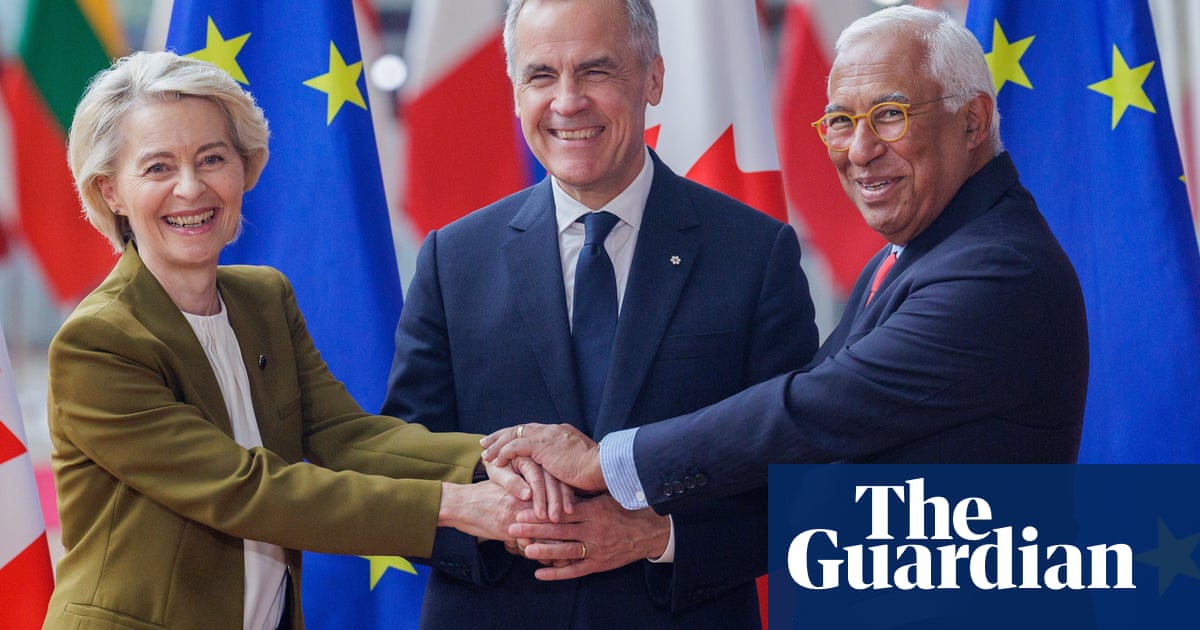Canada has signed a wide-ranging defence pact with the EU, asDonald Trumpand global instability prompt traditional US allies to deepen their alliances.
Canadian prime minister, Mark Carney, on Monday joined European Commission president, Ursula von der Leyen, and head of the European Council, António Costa, in Brussels, where they signed a security and defence partnership, pledged more support for Ukraine, as well as joint work on issues from the climate crisis to artificial intelligence.
At a cordial press conference, Carney described Canada as “the most European of the non-European countries” that “looks first to theEuropean Unionto build a better world”.
Costa spoke in kind: “The European Union andCanadaare among the closest allies in the transatlantic space. We see the world through the same lens. We stand for the same values.”
Not mentioned was another leader in the transatlantic space: Donald Trump, whose disrespect for old allies appears to have galvanised what was an already healthy EU-Canada relationship.
The US president is expected at the two-day Nato summit in the Hague starting on Tuesday, when members of the transatlantic alliance are called to pledge to spend 5% of GDP on defence.
Carney, a veteran central banker turned politician, wona stunning victory in Aprilpledging that Canada would not become the 51st US state, a proposal often floated by Trump.
He said he had a mandate “to diversify and strengthen our international partnerships” and find new means of cooperation and coordination. The summit took place, Carney told reporters: “in a hinge moment of history, a world that is more dangerous and divided, a time where the rules-based international global order is under threat”.
The EU-Canada security and defence partnership opens the door to increased Canadian participation inthe EU’s fledgling €150bn defence fund, known as Safe. Von der Leyen said the defence partnership meant working on joint capabilities, interoperability and joint procurement, referencing air defence. “The access of Canada to our joint procurement in the European Union, the door is open,” she said.
The security pact is a Canadian version of the agreement the EUsigned with the British prime minister, Keir Starmer, last month. The bloc already had similar arrangements with six other countries including Norway and Japan, but this is the first with any country in the Americas. The defence pact includes joint work on cyber, maritime and space security, arms control and support for Ukraine.
Countries that have a defence and security pact with the EU can take part in joint procurement of weapons funded by the €150bn (£128bn, $173bn) Safe programme, although must negotiate a further technical agreement. Von der Leyen pledged both sides would “swiftly launch talks” on Canadian access to the joint procurement scheme.
Carney said the agreement with the EU would help Canada “deliver on our new capabilities more rapidly and more effectively”. Canada has been one of the laggards of the Nato alliance: in 2024 it spent just 1.37% of GDP on defence, well below the 2% set in 2014.
The two sides have a €125bn trading relationship, underpinned by the Ceta pactsigned in 2016that abolished 98% of tariffs. The agreement, however, has yet to be ratified by national parliaments in 10 EU member states, includingBelgium, France, Italy and Poland, meaning elements of the deal have yet to enter into force.
In advance of the meeting, Carney and his wife, Diana Fox Carney, visited Schoonselhof military cemetery in Antwerp, where 348 Canadians are buried. On social media, Carney wrote: “brave young soldiers who ventured across the Atlantic to defend the freedom of Europe”.
The Carneys were accompanied by Belgium’s prime minister, formerly a long-serving Antwerp mayor, Bart De Wever, where they were given a tour of the ceremony and laid wreaths on behalf of Belgium and Canada. The last post was played by one of De Wever’s sons, according to local paper Het Nieuwsblad.
